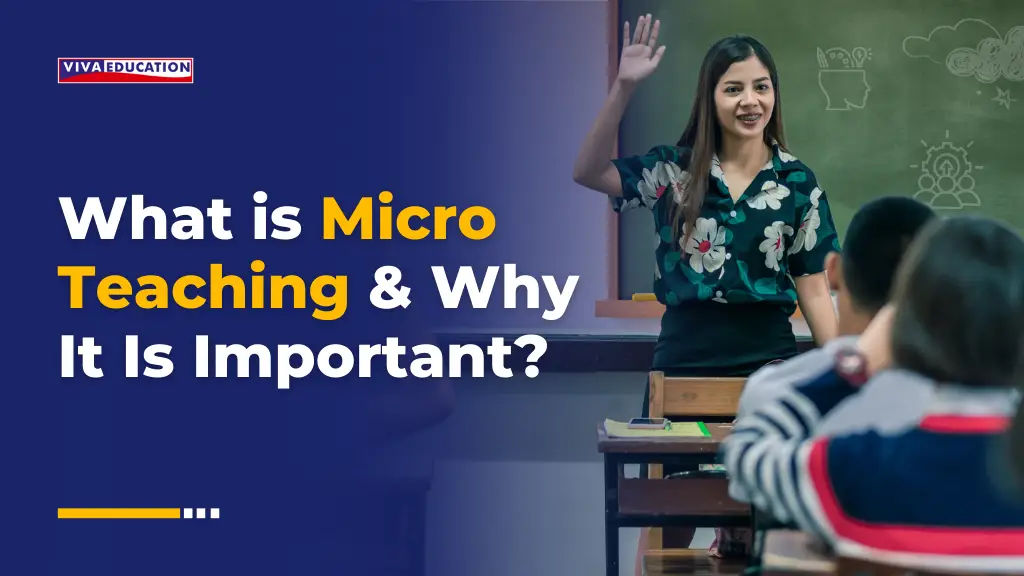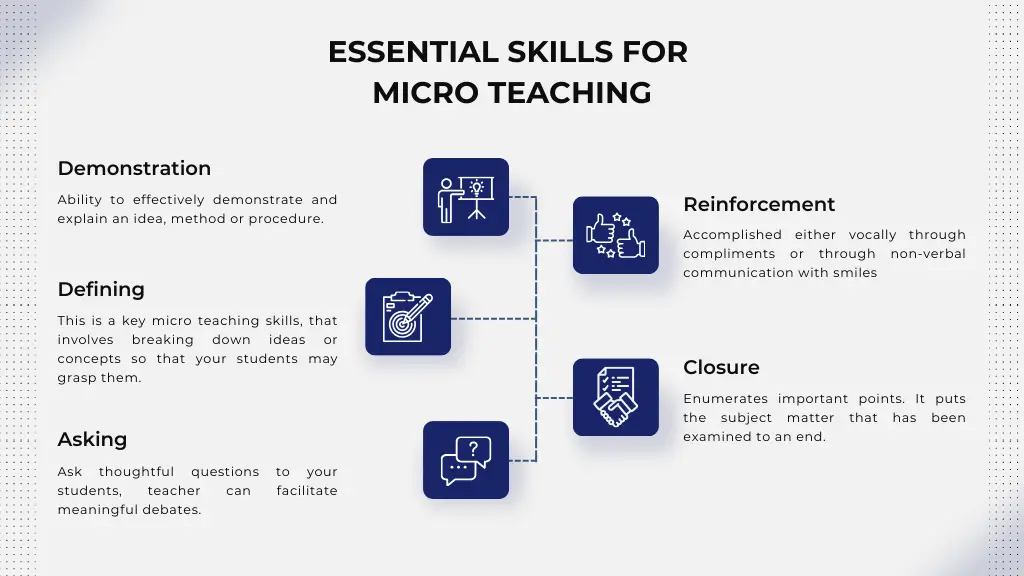What Is Micro Teaching and Why Is It Important?
- Teachers
- August 16, 2024
- Viva Education

As Aristotle has aptly said, “Teaching is the highest form of understanding”. Every student has a unique mindset, which necessitates a unique learning strategy. In order to make students understand and learn better, teachers try to adopt ways to better their teaching techniques and classroom efficiency. One of the techniques to improve efficiency is Micro Teaching.
Micro Teaching is one of the major innovations in teacher education. It is being increasingly acknowledged as a crucial component of various programmes designed to prepare teachers for classroom teaching, by helping them learn certain teaching techniques through practice and feedback.
In this blog, we will talk about what microteaching is, how it operates, and why it is crucial.
What Is Micro Teaching?
Micro teaching is a compact, practice-based method of teacher’s training.
It involves the technique of giving a quick lecture to a select group of students or peers, followed by a review and feedback session. It was developed by Dwight Allen and his associates at Stanford University in the 1960s.
Micro teaching technique aims to create a disciplined atmosphere where teachers can focus on particular teaching skills, such as utilising instructional resources, managing the classroom, and developing compelling questions.
Essential Skills for Micro Teaching

1. Demonstration
Ability to effectively demonstrate and explain an idea, method or procedure. However, you should keep in mind that the explanation should be interesting, engaging and clear to your students.
2. Defining
This is a key micro teaching skills, that involves breaking down ideas or concepts so that your students may grasp them. While adapting these skills, you need patience, compassion and effective communication.
3. Asking
Another very important micro teaching skill is the ability to ask thoughtful questions. By asking thoughtful questions to your students, teacher can facilitate meaningful debates.
4. Reinforcement
You need to use this skill to motivate your students to respond more and more.
Notably, this is accomplished either vocally through compliments or through non-verbal communication with smiles. It’s a response strategy built around the idea of feedback.
5. Closure
When a lesson or presentation is effectively concluded, it is referred to as the ’skill of closure’. It also enumerates important points. It puts the subject matter that has been examined to an end.
Importance of Micro Teaching
1. Skill Enhancemen
The potential of micro teaching to assist you in focusing and refining your teaching methods is one of its main advantages.
Because of all of your duties, it could be hard for you to focus on certain skills in a regular classroom. To address this, micro teaching breaks up teaching duties, such as lesson planning, classroom management, and questioning techniques so that you may practise and improve them in a more comfortable environment.
This concentrated approach will help you acquire the skills that are required to perform well in the classroom.
You can better meet the many demands of teaching in the real world by developing these abilities in a controlled environment.
2. Building Self Assurance
A vital component of effective teaching is confidence, and micro teaching is an important way for you to gain it by developing a sense of self-assurance.
It helps you build confidence in your skills without having to worry about making mistakes in class by giving you chances for low-pressure teaching practice.
The framework of microteaching, which allows you to re-teach sessions after receiving feedback, helps to overcome fears and build confidence. You can become more confident and perform better in the classroom by going through the iterative and tautological process of teaching, getting feedback and then, teaching again.
3. Prompt Responses
Micro Teaching offers quick feedback from peers or mentors, which is one of its biggest benefits.
It may be challenging for you to make quick adjustments in a typical classroom setting because feedback is sometimes delayed. On the other hand, real-time feedback from microteaching enables you to quickly pinpoint areas that need improvement.
You can improve their methods and create more successful lesson plans with the aid of this instant feedback loop.
Promptly acting upon feedback enhances professional development, ensuring effective modifications in teaching approaches.
4. Collaboration and Synergy
Micro Teaching encourages you to work together. You can collaborate with colleagues in several micro teaching sessions, exchanging feedback, thoughts and experiences.
You can learn from one another and develop strong professional networks in this encouraging learning environment that is created by collaborative approach.
Peer knowledge and experience can offer insightful viewpoints that enhance the micro-teaching experience and advance the professional growth of all involved teachers.
5. Thoughtful Approach
Additionally, a contemplative or reflective attitude to professional development is encouraged by micro teaching.
Reflective practice is the process through which you can evaluate your own instruction critically, find out its strengths and weaknesses, and make adjustments accordingly to become more successful teachers.
The foundation of micro teaching is this methodical approach to self-improvementthat promotes ongoing professional development.
Conclusion
Teacher preparation is one area that can reap enormous benefits from micro teaching. The emphasis in this regard is on developing specific teaching skills through practice, feedback and reflection.
Micro teaching skills enable you to sharpen your techniques along with building confidence to make your style of classroom teaching more effective.
Given the constant improvements in education that we see happening around the world, the importance of micro teaching in training teachers to meet the needs of modern classrooms cannot be overstated.
There is no denying the fact that micro Teaching has emerged as one of the most significant and productive ways of continuous professional development for teachers at all levels of experience and novices.



